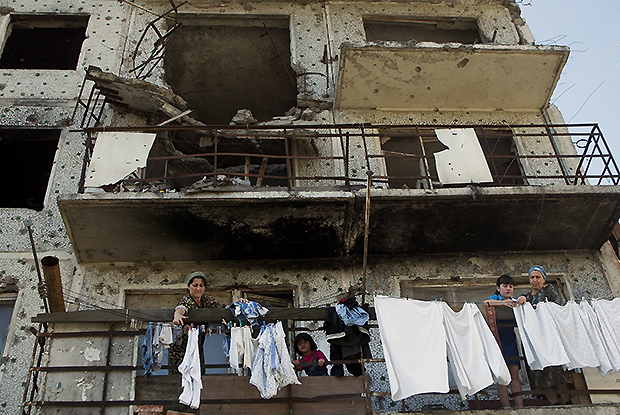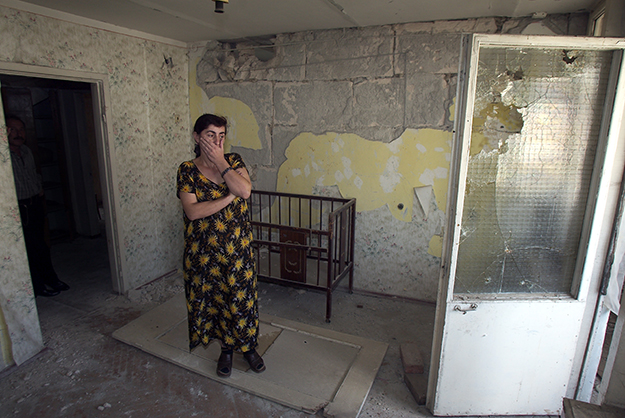In Their Ruined City, Chechens Rebuild Lives One Window at a Time
GROZNY, Russia : October 12, 2003 : When 14-year-old Asya comes home from school, she ducks under a sign warning ”Mines,” steps through a broken doorway and climbs a dark staircase past empty apartments where wind blows through the shattered walls.
On the stairs, where elevator doors have been kicked in by soldiers hunting for rebels, she might pass Nura Datsayeva, who lives in only one room of an apartment because the other room has lost its floor.
Usually the stairwell is empty. Asya and her family have almost no neighbors in this bombed and ruined building, with its vacant windows, sagging balconies and crumpled walls. Most of its 450 apartments stand empty.
After four years of war, there are hundreds of buildings like this in Grozny, Chechnya’s capital — whole neighborhoods of ragged architectural skeletons picked clean by looters as if by hungry maggots.
But there is a faint heartbeat in some of these dead buildings. Here, among the rows of empty windows, a single white lace curtain is seen. There, a string of bright laundry has been hung to dry. There, in the black silence at night, one or two or three windows glow with light.

Through the worst of the terror and hunger and cold of the war, a handful of people refused to leave, huddling in their homes or basements. Now that the bombing has stopped, a handful more have been returning to their ruined homes and their ruined lives.
”Sit, please, sit wherever you like,” said Asya’s mother, Roza Khazuyeva, 35, to a visitor who had seen her laundry and climbed the narrow stairs.
The apartment is cozy, clean and busy with children. Thin carpets cover the hard floors and plastic sheets seal the windows. Warm smells come from the kitchen.
A flicker of life inside this hollow building, the apartment is crowded with bright plastic toys, a bowl of paper flowers, a tricycle, a cat and a crib for baby Amalia, just a month old, the fifth child in the family.
It is a harsh and precarious place to make a home.
”We would have thought the same thing,” said Ms. Khazuyeva, anticipating the question. ”How can people live like this? How could we live like this? But we live.”
It is hard to explain. ”A person appears on this earth only once,” she said. ”We are sick and tired of being afraid.”
In words that were repeated again and again by tenants in other cold and empty buildings, she added, ”A person wants to be at home, wherever it is.”

Outside this home, there is gunfire every night. ”It is unpleasant, but we are used to it,” Ms. Khazuyeva said. ”When it’s close, the children are afraid. They say, ‘Let’s go into the hall away from the windows.’ ”
It is when Asya goes to the small school that has opened nearby that her mother worries.
”If she is 5 or 10 minutes late coming home, I can’t sit still,” Ms. Khazuyeva said. ”You never know what’s on the road. All these young men out there.”
After an attack near the school not long ago, her husband, Ruslan, who drives a taxi, put the children through a training drill — ”Lie down, stand up, lie down, stand up.”
Now home from school, Asya smiles and her eyes sparkle as she cradles her baby sister. Asya says she is happy here.
But over the months, her mother said, she has been losing her hair from the tension of life in a war zone. Her brother Ayzan, 13, has begun to develop an eye ailment. Her sister Iznaur, 12, is partly deaf from the sounds of explosions.
”There are no healthy people in Chechnya,” Ms. Khazuyeva said. ”Everyone is sick. Always, something hurts.”
When Ms. Datsayeva, 64, their neighbor, returned three years ago, she said, she was afraid to enter her home.
”Is anybody here?” she said she shouted into the empty stairwell.
”I was trembling with fear all through that first night,” she said. ”It was dark. There was nobody in the building. There was rubble everywhere. I was afraid to leave my room.”
On her family’s first night in their bare and bleak apartment, Ms. Khazuyeva said, six people slept in two beds for warmth.
In the years since then, the Khazuyev family and a handful of neighbors have created a sort of normalcy here. Ms. Datsayeva has used a sheet of plywood to seal off her room without a floor.
As in other buildings, the neighbors have pooled their money to string an electric line from a nearby clinic. They have jury-rigged a pipe to bring gas for heat and cooking and they have dug a well for water.
In the sun-dappled afternoons, among the rusting shells of cars and the tangled overgrowth of a vacant lot, men gather behind the building to play cards. Children shout and ride bicycles.
In the evenings, like families anywhere, the Khazuyevs watch television. It is a daily reminder that in fact, normal life is somewhere far away.
”We look at all the life on television and it’s a different world,” Ms. Khazuyeva said. ”They advertise for cat food and my husband says, ‘Well, some people have nothing more to worry about.’ ”
”The children see the circus on television, and they’re amazed,” she added. ”They’ve never seen anything like it. They keep asking me, ‘Have you been to a real circus?’ ”
Even the beautifully paved roads they see astonish them, she said. ”I tell them, ‘Yes, we used to have roads like that.’ ”
Copyright The New York Times